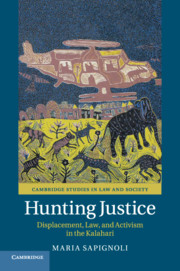'The legal battle waged by the San to defend their livelihoods from a history of dispossession has made their remote villages in the Central Kalahari into an epic battle-ground for elemental human rights and values. Sapignoli’s meticulous account of this contest makes plain the complex mix of actors or interests in play, the daunting odds - and ever-present threat of appropriation - arraigned against her beleaguered litigants. Yet she mounts a compelling case against too simple a dismissal of the uses of insurgent lawfare: the San hunt for justice was no simple victory; but it has reshaped them as legal subjects, enabling new visions of entitlement and possibility.'
John Comaroff and Jean Comaroff - Harvard University, Massachusetts
'The book by Maria Sapignoli is a valuable contribution to the study of activism and social justice in Africa. Starting with the San case, the ethnographic research on which this volume is based has involved, in a creative and original way, the Kalahari villages, local NGOs, the Botswana High Court, and United Nations meetings. It is rigorous and exemplary in demonstrating the importance of comparative and multi-sited analysis, rich in generative ideas and theoretical connections that are useful for understanding the wider issues of indigenous rights, beyond the case in question.'
Stefano Allovio - University of Milan
'Invaluable contribution to debates on the indigenous legal turn. A powerful account of landmark litigation by San plaintiffs against Botswana after being forcibly evicted from the Kalahari. But as Maria Sapignoli explains, even a successful verdict does not ensure a favorable outcome, and may prolong rather than conclude their interactions with the legal system.'
Stuart Kirsch - University of Michigan
'Hunting Justice is a well-conceived, beautifully argued, and innovative study of a southern African indigenous peoples’ social justice movement. In this momentous book, Maria Sapignoli assesses human rights, law and law-making, from global, regional, national and local perspectives. Places range from the United Nations to Botswana and small communities in the Central Kalahari Game Reserve. Drawing on court records and her own long-term fieldwork, Sapignoli focuses particular attention on the perspectives of the San and Bakgalagadi who have fought long and hard to retain their existence there and to have their rights to resources and livelihoods of their choice recognized in an African state.'
Robert K. Hitchcock - University of New Mexico, and member of the board of Kalahari Peoples Fund
'Sapignoli's book gives an excellent account of the complexities in the CKGR claim. It is also full of astonishing detail and up to date.'
Alan Barnard - Emeritus Professor of Anthropology, University of Edinburg
'As indigenous peoples gain greater visibility in their demands for recognition and rights, a book detailing the situation of injustice faced by the San (Bushmen) of Botswana and how they took their claims to the national courts and the UN is a truly welcome contribution. In Sapignoli’s meticulous and superbly evocative account, we are given an insider’s story of how an ignored and abused people fought against expulsion from their homelands and took their cause internationally.'
Julian Burger - University of Essex, and Former Coordinator, Programme on Indigenous Peoples and Minorities, UN Office of the High Commissioner for Human Rights





